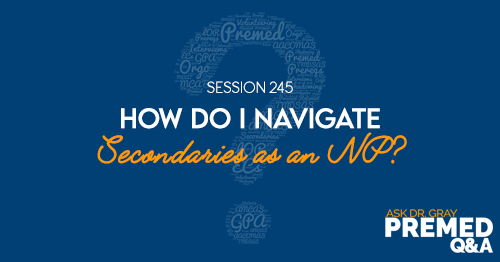Apple Podcasts | Google Podcasts
Session 154
Our student today has always been overwhelmed and unable to focus on his grades. How can he discuss his shortcomings and highlight his strengths in his application?
Ask Dr. Gray: Premed Q&A is brought to you by Blueprint MCAT. Listen to this podcast episode with the player above, or keep reading for the highlights and takeaway points.
The episodes in this podcast are recordings of our Facebook Live that we do at 3 pm Eastern on most weekdays. Check out our Facebook page and like the page to be notified. Also, listen to our other podcasts on MedEd Media. If you have any questions, call me at 617-410-6747.
[00:37] Question of the Day
A little background, we have a nontraditional student who graduated from NYU as a premed. But he didn’t think his grades for premed were great. Then he did a master’s and took on higher-level science courses. And so, he’s wondering how to explain his bad grades.
He says the reason for the bad grades is that he got a little bit excited about going into college. Thinking he could do the same thing he did in high school, he was running cross country and found some new friends.
In sophomore year, his dad got diagnosed with Type II diabetes so he ended up going back home a lot. He went to NYU undergrad and lived on Long Island where his parents were. And he admits he didn’t really prioritize his studies. He thought he could still continue studying and volunteering, and also help his dad. But he didn’t really take into account how much time it took to commute and do those doctor visits.
By his third year, he was still trying to figure things out and in his fourth year, he stopped taking the courses he struggled with. At that point, he was focused on just graduating.
After graduating undergrad, he did a postbac program at a different institution where he took some of the classes he struggled with. He did about 20 credits in the span of a year and a half. The following year, he took more classes then he started to apply to a master’s program to take on graduate-level science courses. He did a Masters in Physiology at first at Case Western Reserve University and got a 3.5 GPA. He admits he was still discovering how to focus on school, but also work on his extracurricular activities in order to be a better applicant to medical school.
'I was really surrounded by a lot of people who had the same goal of going to medical school. So I fell on the motivation of really studying and having a support system.'Click To Tweet[08:52] To Prove Academic Capability
This student got overwhelmed with the courses so he didn’t do very well. He’s a B plus student and that’s okay. We just need to hope that medical schools will accept him as a B plus student. The student is in the middle of a cycle now and there’s really not much that he can do to explain his bad grades.
“3.5 is not bad. But when you're trying to prove your academic ability to a medical school, you want to be as close to a 4.0 as possible.”Click To TweetWhen you are starting off with early struggles, that means the later courses need to be as close to a 4.0 as possible to show you’re good. Now, the question is, will a 3.5 be sufficient for that? And so, just apply to medical school and cross your fingers hoping you get in.
[11:42] Medical Schools Expect More
In terms of how to explain his grades, this student has this long track record of just not doing super great. His dad being diagnosed with diabetes may just be an excuse. Obviously, dealing with family health issues is hard. But he only has one semester or one year of dealing with that.
Obviously, diabetes could be a chronic thing. And his dad could still be dealing with those things that could still be a reason for this student to get distracted. But at some point, the medical schools are going to expect you to adjust because the same thing is going to happen in medical school and the same thing is going to happen in residency. Unfortunately, this student has not done that academically.
“Things are going to get thrown your way and that is going to throw you off your game, and you're going to be expected to adjust.”Click To TweetMedical schools need to make sure you’re going to finish medical school. A 3.5 GPA is probably good enough to get through medical school. But when you’re dealing with a student who’s trying to overcome early struggles, they like to see a little bit more.
[13:18] Looking at Other Parts of the App
At the end of the day, you have to tell your truth. And for this student, his truth is that he always had a lot of stuff going on in his life that he has never been able to fully focus on grades.
Our student has a 507 MCAT score. It’s a good score, but not a stellar score. This potentially eases some concerns of medical schools with maybe a little bit lower GPA, but a decent MCAT score. It’s still a little bit lower than the average for matriculants in medical school, but it’s not a bad score.
Looking at the rest of his application, a lot of his extracurriculars are strong. During the time he was studying for the MCAT, he worked full-time as a clinical research coordinator. He specializes in enrolling patients into their Type II diabetes telehealth study. They try to see if patients from underserved communities are willing to enroll in their study.
He loves having the opportunity to talk to patients as well as do data entry, collect data, and come up with their own sub-studies. He has been working on coming up with particular ideas and studies he could publish as a first author. An example is finding out why Hispanic Latino patients don’t want to participate in research.
[16:27] He Got an Interview!
Our student mentions he had an interview at SUNY Downstate. His challenge was just trying to be real. At first, he was nervous because he was trying to remember the things he wrote and the themes he wanted to make a point of.
But that’s not how to prepare for an interview. All you need to do is just have a conversation and it makes things so much easier that way.
His grades did come up in the interview in two ways. The first one was when he was asked about one weakness in his application. The second one was to tell them a time in undergrad that he struggled with a class and what he did to overcome it.
His answer for one of his weaknesses is learning to handle several things at a time while still focusing on that one main important thing, which is his grades.
[19:19] Living with ADHD
Our student also talks about his struggle with the primary and secondary applications in terms of how to deal with medical conditions. For instance, he got diagnosed with ADHD and he didn’t want to use that as an excuse.
Personally, I think it’s not something that you need to discuss at all with the medical schools prior to an interview or prior to an acceptance.
If you need any sort of accommodations with ADHD, then that’s just something post-acceptance that you talk to the school about. It’s part of the welcome packet and the paperwork that you deal with when you get accepted to school as they ask those types of questions. But you just have to live with it and learn to have it just be a part of you.
[21:04] How He Prepped for the MCAT
Our student used Blueprint MCAT to study for the MCAT. He liked how it was structured so he was able to work it into his schedule. And since he worked full-time, he was able to include the hours he could study. He learned that he needed structure in his studying. They rotated all the subjects into his studying which he found to be very helpful for him to do well on the MCAT.
The first time he took the MCAT he got a 500 and he was all over the place. But after having a study plan with Blueprint, he got a 507.
Specifically, in his CARS section, he got 128 the first time, and this time, he got a 132. And he’s happy he used Blueprint since they really focused on strategies, especially with CARS and knowing that he can’t just study for it and he needs to practice.
Links:
Medical School HQ Facebook page
Medical School HQ YouTube channel
Instagram @MedicalSchoolHQ
Join the Application Academy!
The Premed Playbook: Guide to the Medical School Personal Statement
The Premed Playbook: Guide to the Medical School Application Process
SEARCH SITE
LISTEN FOR FREE












